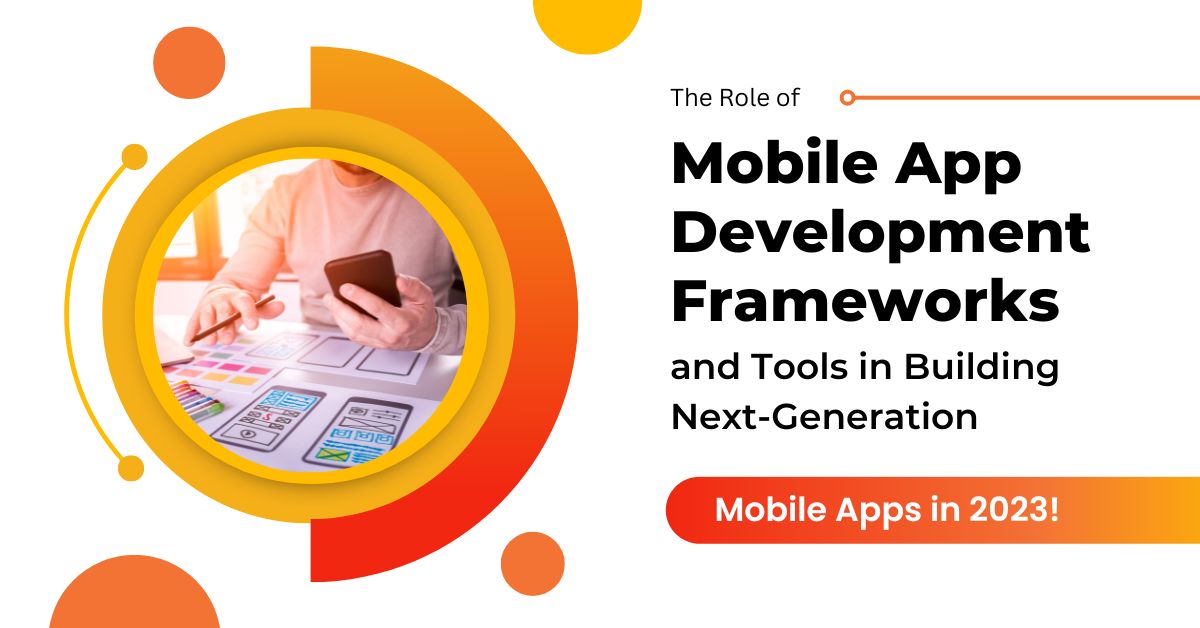 ChatGPT
ChatGPT
 Grok
Grok
 Perplexity AI
Perplexity AI

4 min read | By Postpublisher P | 21 March 2023 | Frameworks
The use of mobile apps has become an integral part of our daily lives. From ordering food to booking a cab, mobile apps have made our lives more convenient and accessible. As technology evolves, so do the mobile apps. In 2023, we will see a new generation of mobile apps that are more sophisticated and innovative than ever before. To create these next-generation mobile apps, developers will need to leverage the latest mobile app development frameworks and tools.

Mobile app development frameworks are software tools that enable developers to create mobile apps more efficiently and effectively. There are three main types of mobile app development services that offer native, hybrid, and cross-platform apps.
Native app development involves building mobile apps for a specific operating system, such as Android or iOS, using the language and tools provided by the operating system. The finest speed and user experience are provided by native app development, but it can be time-consuming and expensive.
Hybrid app development involves building mobile apps that combine native and web technologies. Developers use web technologies such as HTML, CSS, and JavaScript to create the app’s user interface and use native code to access device-specific features. Hybrid app development offers a balance between performance and cost but may not provide the same user experience as native apps.
Cross-platform app development involves building mobile apps that can run on multiple operating systems using a single codebase. Developers use cross-platform app development frameworks such as React Native, Xamarin, or Flutter to create mobile apps that can run on both iOS and Android devices. Cross-platform app development offers the best balance between cost and efficiency but may not provide the same performance as native apps.
Mobile app development frameworks and tools play a critical role in building next-generation mobile apps. With the increasing demand for mobile apps, businesses are focusing on delivering high-quality apps that are scalable, reliable, and responsive. Mobile app development frameworks and tools provide developers with a structured approach to building mobile apps, enabling them to create robust and feature-rich apps quickly and efficiently.

In addition to mobile app development frameworks, developers use a variety of tools to create mobile apps more efficiently and effectively. These tools include:
IDEs are software applications that provide developers with a comprehensive environment for building and testing mobile apps. IDEs such as Android Studio or Xcode provide developers with a range of tools for debugging, testing, and deploying mobile apps.
SDKs are software development tools that provide developers with a set of libraries, APIs, and tools for building mobile apps. SDKs such as Google Play Services or Apple’s iOS SDK provide developers with access to device-specific features such as location services or push notifications.
APIs are interfaces that enable different software applications to communicate with each other. Mobile app developers use APIs such as Facebook’s Graph API or Google Maps API to integrate third-party services into their mobile apps.
Debugging and testing tools such as Appium or TestFlight help developers identify and fix issues with their mobile apps. These tools enable developers to simulate different scenarios and test their apps on multiple devices.
UI design tools such as Sketch or Adobe XD enable developers to design the user interface of their mobile apps more efficiently and effectively. These tools provide developers with a range of design templates, icons, and UI elements to choose from.
Analytics and reporting tools such as Google Analytics or Firebase Analytics enable developers to track the performance of their mobile apps and gather insights into user behaviour. These tools provide developers with data on user engagement, retention, and conversions, helping them optimise their mobile apps for better performance and user experience.

The next generation of mobile apps will be more sophisticated and innovative than ever before. To create these mobile apps, developers will need to leverage the latest mobile app development frameworks and tools.
The world is increasingly becoming mobile-first, and businesses across industries are investing in mobile app development to stay ahead of the curve. However, building next-generation mobile apps requires more than just coding skills. Developers need to leverage the right mobile app development frameworks and tools to build apps that meet the evolving needs of users and businesses alike.
Mobile app development frameworks and tools play a vital role in enabling developers to create scalable, reliable, and feature-rich apps. These tools provide developers with a structured approach to building mobile apps, enabling them to focus on the unique features and functionality of the app rather than writing basic code from scratch. Additionally, mobile app development frameworks and tools help developers to improve the user experience, integrate with backend services, ensure app security, and reduce development time and costs.
In conclusion, mobile app development frameworks and tools are essential components of the mobile app development process, enabling developers to build next-generation mobile apps that meet the evolving needs of users and businesses. With cross-platform development, accelerated development, improved user experience, integration with backend services, and security features, mobile app development frameworks and tools offer a structured approach to building mobile apps, reducing development time and costs, and ensuring app scalability, reliability, and feature-richness.
As businesses across industries continue to invest in mobile app development to stay ahead of the curve, the role of mobile app development frameworks and tools in building next-generation mobile apps cannot be overstated. Developers must leverage the right tools and frameworks to build apps that can drive growth, enhance customer experience, and stay ahead of the competition. Therefore, businesses must invest in the right mobile app development frameworks and tools to build apps that can meet the evolving needs of users and businesses alike, ensuring a successful mobile app development journey.
Join over 150,000+ subscribers who get our best digital insights, strategies and tips delivered straight to their inbox.